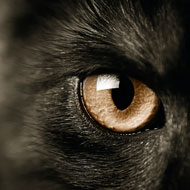
Raltegravir requires only once-a-day dosing
A model system developed to test medication for feline herpesvirus 1 (FHV-1) has identified a new drug that only needs to be applied once-a-day.
Identified by scientists at Cornell's College of Veterinary Medicine, raltegravir is used in humans to treat HIV infections, but it had never been used to treat FHV-1 in cats.
“We found that it is very effective against FHV-1. It even worked when we applied the drug only once every 24 hours,” says study leader Dr Gerlinde Van de Walle.
The team identified the drug while developing a model to test drugs that treat feline eye infections.
Described in the Journal of General Virology, the new model used corneas donated from cats that died of causes other than eye disease. Researchers say this method offers a better reflection of what happens in the eyes of a cat, than models consisting of cells in a petri dish.
In the study, the team applied the FHV-1 virus to some of the corneas and tested the effectiveness of two commonly prescribed drugs: cidofovir and acyclovir.
Both drugs cleared the infection when applied every 12 hours, but cidofovir was more effective.
The team then used the model system to test raltegravir. They found that it was just as effective as other drugs for treating FHV-1 infections and only needed to be administered once a day.
Dr Walle says that she eventually hopes to see the drug tested in a well-controlled clinical trial.



 The Veterinary Medicines Directorate (VMD) is inviting applications from veterinary students to attend a one-week extramural studies (EMS) placement in July 2026.
The Veterinary Medicines Directorate (VMD) is inviting applications from veterinary students to attend a one-week extramural studies (EMS) placement in July 2026.